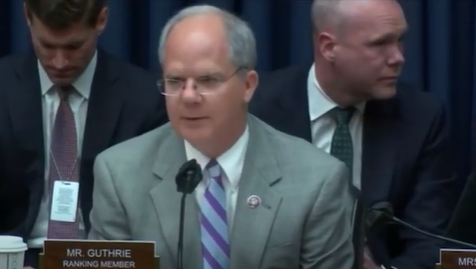Latest News
Guthrie’s Substance Use Disorder Treatment and Recovery Services Bill Examined In First Congressional Hearing
Washington,
April 5, 2022
|
S.K. Bowen
(202-225-3501)
Tags:
Health Care
WASHINGTON, D.C. – Congressman Brett Guthrie (KY-02) advocated for his Substance Use Prevention, Treatment, and Recovery Services Block Grant Act of 2022 during an Energy and Commerce Health Subcommittee hearing today. The legislation would provide critical substance use disorder services, including treatment and recovery services, to individuals seeking help across the Commonwealth and United States. Guthrie is the Republican Leader of this Health Subcommittee and is the lead Republican on the Substance Use Prevention, Treatment, and Recovery Services Block Grant Act of 2022. The legislation received its first congressional hearing during today’s hearing on mental health. Guthrie also discussed the Comprehensive Opioid Recovery Centers program established by his legislation, the Comprehensive Opioid Recovery Centers Act, which was signed into law by President Trump. Guthrie also criticized the Biden Administration’s questionably effective public health measures, including proposing a grant program that could have used federal funding to purchase crack pipes for users.
Rep. Guthrie delivering opening remarks during Health Subcommittee hearing Opening Remarks as Prepared for Delivery: Thank you, Madam Chair. Substance use disorder and the growing mental health needs are two things that I frequently hear about when I am home in Kentucky. The Commonwealth has been battling the drug epidemic and its associated consequences for far too long. The COVID-19 pandemic only made substance use disorder and mental health issues across Kentucky and the nation worse. Onerous lockdowns, which recent reports show were ineffective at slowing the transmission of COVID-19, caused some of the most vulnerable populations to live in social isolation for months with little-to-no connection to critical community-based support services. These measures unsurprisingly coincided with drastic increases in overdoses throughout the pandemic. In a 12-month period ending in April 2020, the reported number of drug overdoses across the country was 77,000 and then sadly jumped to 101,000 in a 12-month period ending in October 2021. Overdoses from synthetic opioids also rose significantly during the pandemic with the Centers for Disease Control and Prevention’s data showing that illicit fentanyl and its analogues were the leading cause of death for individuals ages 18 to 45 between 2020 and 2021. In Kentucky, illicit fentanyl accounted for over 70 percent of these drug overdoses in 2020 alone, up from 58 percent in 2019. Despite all of this, the Biden Administration doubled down on these questionably effective public health measures. The Administration’s response to these alarming overdose rates was to keep our schools closed, turn to masking mandates and policies grounded in politics, and even propose a grant program that could have potentially provided federal funding to purchase crack pipes for users, if not for significant bipartisan pushback. Worse, the Administration and Congressional Democrats have rejected calls by House Republicans to permanently schedule fentanyl-related substances as Schedule I drugs. These poisons are largely flooding into our country through the Southern Border at a rate at which we have never seen. Between fiscal years 2020 and 2021, illicit fentanyl seizures at the Southwest Border increased by more than 130 percent. My colleagues and I on this committee wrote directly to President Biden asking for his plans to fight illicit fentanyl trafficking. We have yet to receive a response. My Republican colleagues and I on this committee will continue our push to pass the HALT Fentanyl Act, which would permanently schedule fentanyl-related substances as Schedule I drugs under the Controlled Substances Act. This will give our law enforcement officials the tools they need to effectively crackdown against illicit fentanyl trafficking, will serve as deterrent for the drug cartels to develop variations of these poisons, which we know works, and will most importantly help to save American lives. To effectively curb the growing drug overdose epidemic, we need to focus an equal amount of attention on providing access to recovery and treatment resources for those seeking help. I am proud of the bipartisan track record this committee has in advancing legislation designed to bolster resources for those with substance use disorder. My bipartisan Comprehensive Opioid Recovery Centers Act was signed into law by President Trump in 2018 as part of the overwhelmingly passed SUPPORT for Patients and Communities Act. This law established programs designed to provide funding to local organizations delivering a full range of recovery and treatment services in communities with high drug overdose mortality rates. This program importantly recognizes that there is no one-size-fits-all solution to combating addiction. Funds can be used for withdrawal management services, community-based peer recovery support services, and job training for those looking to reintegrate into the workforce. I am especially grateful and proud to have had the support of two of my colleagues on this committee, Representatives Bucshon and Schrader, and I look forward to continuing to find opportunities to promote access to recovery and addiction treatment services. That is why I am proud to co-lead on the bipartisan Substance Use Prevention, Treatment, and Recovery Services Block Grant, which was introduced by Representative Tonko and being heard before the committee today. This legislation would reauthorize the Substance Abuse Prevention and Treatment Block Grant program that provides funding to states to deliver coordinated substance use disorder prevention and treatment services. The legislation would also now make clear that the block grant funds can also be used to provide recovery support services. Above all, it is incredibly important now more than ever, for Congress to be working on bipartisan solutions to address and close gaps in care for those seeking help. I look forward to advancing many of these critical proposals and I thank my colleagues for their hard work on these issues. I yield back. ### |

